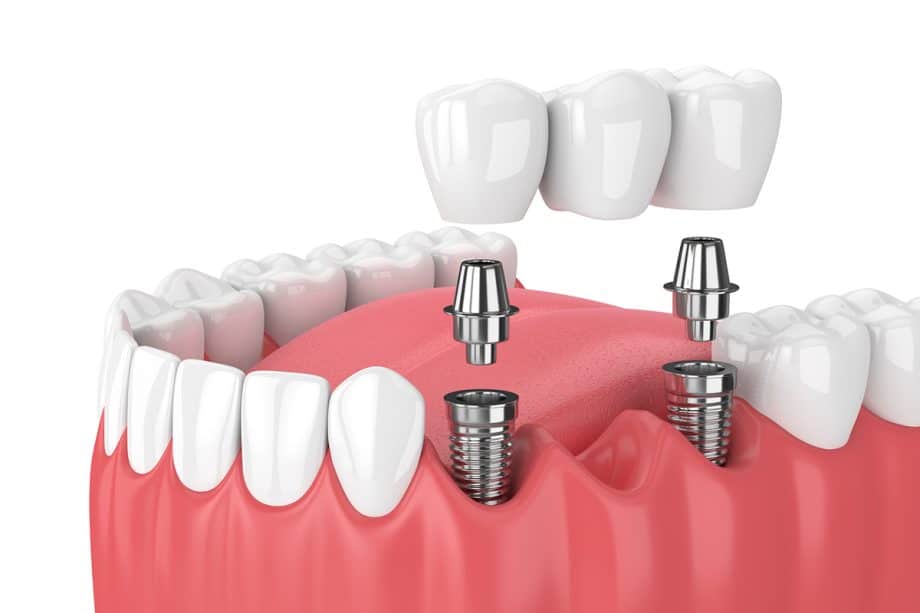If you have damaged or missing teeth, a dental bridge can help you regain your chewing ability and restore your smile's appearance. Since a dental bridge is new to your mouth, it may take about two weeks to get used to it.
About Dental Bridges
A dental bridge permanently replaces damaged or missing teeth. Each bridge consists of two major parts: the abutment, which connects to your natural teeth on one or both sides, and the pontics, or artificial teeth. A bridge can replace from one to four teeth at a time.
Types of Dental Bridges
Traditional Bridge
A traditional bridge uses prepared natural teeth as supports. The dentist places crowns on the natural teeth on either side of the gap where the artificial teeth will reside.
Maryland Bridge
A Maryland bridge does not use crowns for support. Instead, it uses a ceramic or metal structure with wings to hold the bridge. These bridges put less stress on adjacent teeth but are more fragile than regular ones.
Cantilever Bridge
Cantilever bridges have a crown on just one side. Cantilever bridges stress the tooth used as the abutment, so they are typically used as a last resort.
Implant-Supported Bridge
Most bridges connect to crowns on adjacent natural teeth, but your dentist can also place implants to anchor a bridge. Dentists often prefer implant-supported bridges because they do not need support from adjacent teeth. They are more sturdy and stable than crown-supported bridges.
The process of receiving an implant-supported bridge is longer than a standard bridge because the new implants need to heal before the process can move forward.
What to Expect When Getting a Dental Bridge
The dentist will check the health of your gums and teeth during your first appointment to ensure they are robust enough to place a bridge. People with excessive tooth decay or gum disease may need to have these problems addressed before moving forward.
Your dentist will take digital or physical impressions of your teeth to ensure the new bridge looks and feels as natural as possible. After this step, the dentist will prepare your adjacent teeth for crowns. You will receive a temporary bridge to stand in until your permanent bridge arrives from the dental lab.
The dentist will install your new bridge at your next appointment, adjusting your bite if necessary. You will receive local anesthesia to eliminate discomfort.
After receiving your new bridge, you may feel discomfort for the first few days as your teeth and gums become accustomed to it. You may also notice extra sensitivity to heat and cold for the first few days.
How to Extend the Life of Your Bridge
A new bridge typically lasts about five to seven years, but you can extend its life if you maintain it carefully. Clean your bridge twice daily. Brush and floss as directed. You may need an interproximal brush (a small brush available at any pharmacy) to access food particles around the bridge.
You will need excellent home care and careful professional care to maintain your bridge. Attend all scheduled dental appointments for cleanings and to have your bridge checked.
Use common sense when choosing foods to eat. Your bridge will be strong, but your food choices matter when preserving it for the long term. Avoid eating popcorn, sticky candy, nuts, and hard candy. Avoid chewing gum.
You may also wish to avoid staining foods and beverages like coffee, tea, red wine, and dark chocolate since the artificial teeth on your bridge will be more prone to staining than natural enamel.
When to Call Your Dentist
If you notice the following symptoms in the weeks after receiving your bridge, call your dentist for help:
- Your bite feels uncomfortable
- Swelling gums around the bridge
- Bleeding gums near the bridge
Your bridge may need adjustment before your healing process can continue.
Call Oak Road Dentistry
Getting a dental bridge is a generally non-invasive process with excellent results. Bridges can improve your appearance, chewing ability, and quality of life. While getting used to a bridge can take a few weeks, you will soon enjoy its benefits.
Call our Snellville, GA, office at 770-985-9559 for more information on bridges or to schedule an appointment for a consultation with one of our expert dentists.

